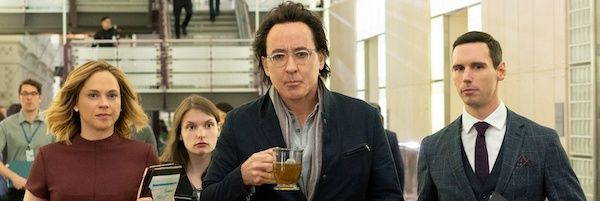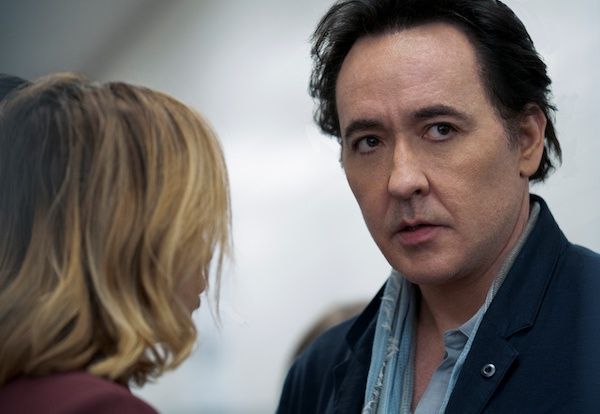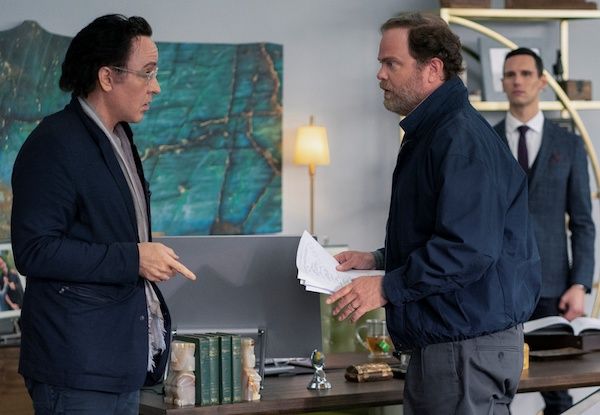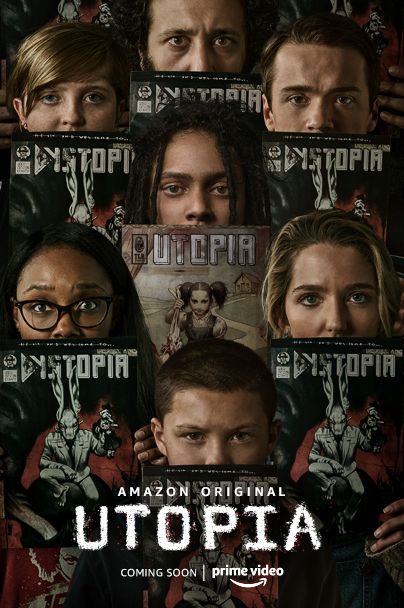From showrunner Gillian Flynn and inspired by the original British series, the Amazon Prime Video eight-episode conspiracy thriller Utopia follows a group of comic book fans who have bonded over their obsession with a seemingly fictional comic that they quickly realize is not only very real but very dangerous, as it predicts threats to humanity. As they find themselves trapped in life-or-death stakes involving the comic’s central character Jessica Hyde (Sasha Lane), this group of friends — Becky (Ashleigh LaThrop), Ian (Dan Byrd), Samantha (Jessica Rothe), Wilson Wilson (Desmin Borges) and Grant (Javon “Wanna” Walton) – have to step up in a big way, if they’re even going to have a chance at succeeding in their mission to save the world.
At the virtual junket for the series, Collider got the opportunity to chat 1-on-1 with actor John Cusack, who plays biotech specialist Dr. Kevin Christie, about what drew him to Utopia, his character, getting into the mood and tone of the show, his creative conversations with Flynn, how he felt about the final episode of the season, and much more.
COLLIDER: When this came your way, what was it that most interested you in being a part of it? Was there one specific aspect of the story, or was it the overall of the story that drew you in?
JOHN CUSACK: It was the overall story. I wouldn’t say it’s an easily recognizable genre but the wild conspiracy thrillers are always interesting and juicy. And then, Gillian’s writing was a big attraction. The idea of enjoying the British show, and then Gillian creating a whole other parallel realm that fits into the original but seems new, all seemed very exciting and very worth doing.
When you do a project like this, do you feel any sense of obligation to honor the original series, or is it easier not to feel that when you’re playing a character that didn’t previously exist?
CUSACK: You just work with what’s on the page and what you have in front of you. My character wasn’t in the original British show. I know the original British show was involved, so they both exist on a parallel track and are their own thing.
Was there any specific preparation that you did for this? Gillian Flynn has talked about certain influences she had, as far as movies and certain thrillers. Did you watch any movies? Did you do anything to get into this whole mood and tone?
CUSACK: Yeah, you immerse yourself in the world. Gillian and I would trade different stories or books or poetry or films or songs. It’s a collaborative talk about tone and theme. There was almost a sense of a dystopian Willy Wonka to the character. It was a very wild character that she created, and it was fun to create him with her.
Was there anything specific that you feel most helped you in finding him or really getting an understanding of this?
CUSACK: Yeah. It stands in a tradition of something like Dr. Strangelove, with the moral questions that human beings are asking in the nuclear age, with George C. Scott and Peter Sellers. If you actually think about what they’re talking about, it’s absolute madness but it’s also a strange reflection of the actual reality that we live in. Satire is where this kind of conspiracy thriller cuts dangerously close to the bone, and that’s how it should be. We also talked about Network, the great 1975 film that preconceived what infotainment would become – news, entertainment, reality TV, and all of these personalities. It’s probably ahead of its time, in the tradition of a certain kind of conspiracy thriller and also satire, which is not the right exact right word but it’s close.
Gillian Flynn has talked about how she thought about all of the little details for all of the characters. When you had conversations with her about that and you were discussing the surroundings of the character, the way he dresses, and the way he moves and talks, were there any little details or aspects of the character that helped you find him, every time you played him?
CUSACK: Yeah. She had her obsessions about the character and I had my obsessions about the character, and there were little things that would trigger you into it, in a way. We were always trying to one-up each other, in that way. We would talk about, “What are the limits to Christie?” That was an interesting exercise because you couldn’t really find them. He was willing to do almost anything to achieve his goal, which in theory is to help the world and to help solve the problems. We talked a lot about cult leaders. We had wonderful creative conversations about the piece, probably to her chagrin because I would call her up and text her late at night with, “What about this? What about that?” I’m sure she was just like, “I wish Cusack would shut up,” but she was very kind and it was very fun to go through all of those exercises with a creative partner. It’s a pleasure to work with somebody with that kind of a rigorous, fierce mind. You know that she’s really thought about this and put a lot of effort and care into everything that she does. That’s a great thing, if you can work with something like that. That’s really as good as you can ask for.
Who do you see as the villain of this story, especially from your character’s perspective?
CUSACK: Interesting. Well, I don’t wanna give away too much. In the eighth episode, whatever you think you knew about the characters, gets put into a blender and sent down another rabbit hole with a different Cheshire cat. It’s hard to reveal all of that. I won’t give it away but there are certain things that are revealed and alliances that are revealed and relationships that are revealed in the last episode that many of the characters didn’t know about, until that moment. It’s wonderfully precise, delicious, juicy, twisted storytelling.
Without spoilers, how did you feel about the ending of the season? What was your reaction when you were reading and shooting that final script?
CUSACK: I was really interested in it. It was a cross between a tight rope walker between two buildings and a suicide bomber. I hadn’t read anything like it. I thought, “This is gonna be really hard to pull off. Can you pull this off?” And we did. The sheer ambition of it and the audaciousness of the final episode, it’s gall was gorgeous. I was just like, “Really, you’re gonna go there? Okay.” It does not back down.
You’ve played some very memorable characters in your career. Is there a past character that you’ve played that you’d like to revisit and catch up with, if there were an opportunity?
CUSACK: I haven’t really done sequels as much. I did a couple of loose sequels, where I felt like I had something else to say with the character but you can’t get the rights, so you just do another version of it. I did that a couple of times. I always thought there was another version of 1408, where he could wake up back in the room and continue on. That’s just getting into that Stephen King headspace. He’s such a terrific writer, and I do love like that Rod Serling psychological horror and not as much the gore. Although I love George Romero and the original Dawn of the Dead and Night of the Living Dead. I’m great fans of those and I think they’re really great. The Shining and Stephen King, I love that stuff. That could be a fun thing to do but it never came up.
Utopia is available to stream at Amazon Prime Video. For more, read our interview with showrunner and writer Gillian Flynn.
Christina Radish is a Senior Reporter of Film, TV, and Theme Parks for Collider. You can follow her on Twitter @ChristinaRadish.




